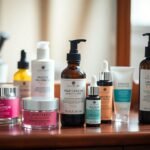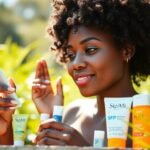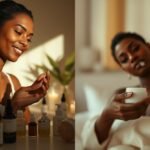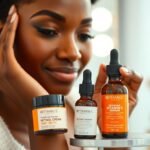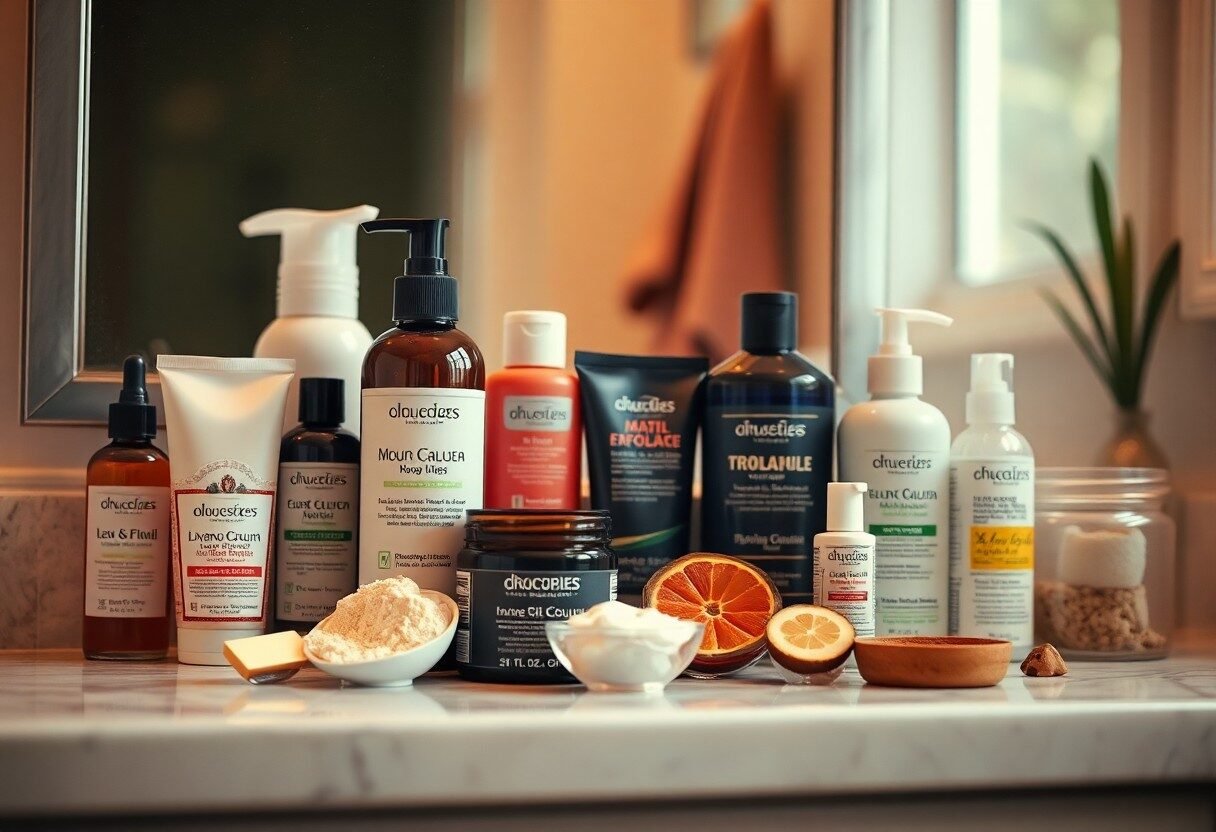
Most of us know that exfoliation is key to achieving a radiant complexion, but it’s especially important for African American women, as our skin often requires specific care to avoid issues like hyperpigmentation and ingrown hairs. In this post, I’ll share my top picks for the best exfoliators that not only cater to our unique skin needs but also nurture and revitalize our complexion. Let’s explore how to find the perfect products that will help you achieve that coveted glow without compromising your skin’s health.
Key Takeaways:
- Exfoliation frequency should be tailored to individual skin type; typically, 1-2 times per week is recommended.
- Look for exfoliators that contain gentle ingredients such as AHAs (Alpha Hydroxy Acids) and BHAs (Beta Hydroxy Acids) suitable for darker skin tones.
- Physical exfoliators can be effective, but opt for those with fine, smooth particles to avoid irritation or microtears in the skin.
- Consider using chemical exfoliators like glycolic acid and lactic acid to promote cell turnover without the risk of physical abrasion.
- Stay hydrated and pair exfoliation with a good moisturizer to maintain skin balance and prevent dryness.
- Patch testing new products is imperative to avoid potential allergic reactions or sensitivity, especially for textured or sensitive skin.
- Consulting with a dermatologist can provide personalized advice tailored to specific skin needs and concerns.
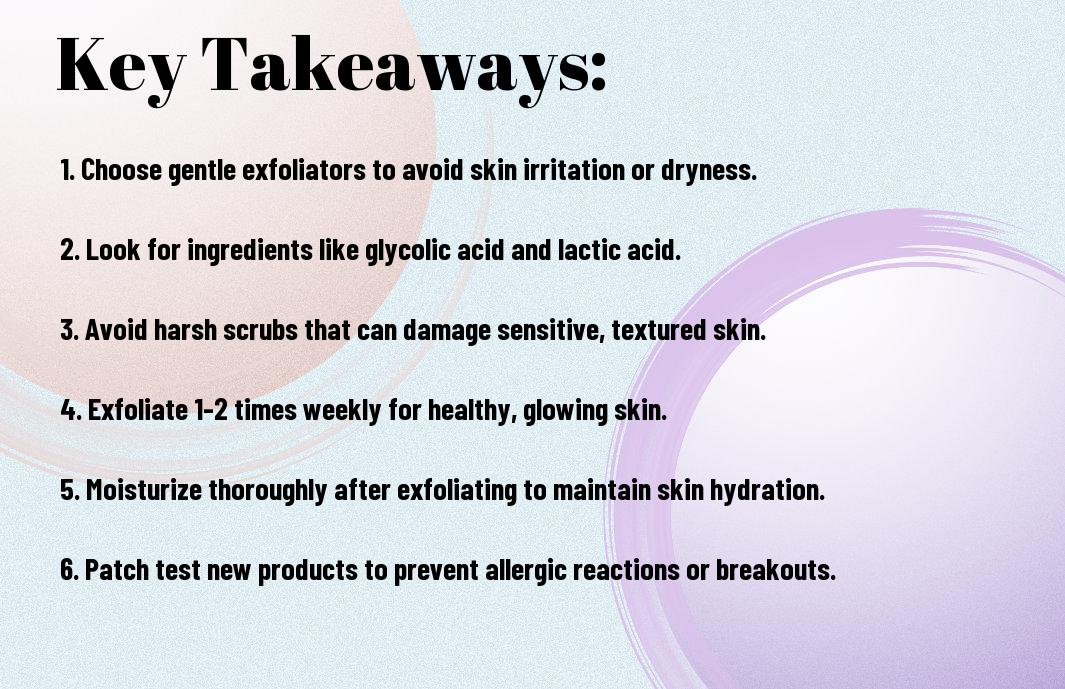
The Unique Skin Concerns of African American Women
Understanding Hyperpigmentation
Hyperpigmentation is a common concern for many African American women, often resulting from past acne, injury, or sun exposure. Dark spots or patches appear due to an overproduction of melanin, creating an uneven skin tone. Many opt for products that contain ingredients like niacinamide or vitamin C to help brighten these areas and create a more uniform complexion.
Addressing Uneven Skin Texture
Uneven skin texture can manifest as rough patches, enlarged pores, or dullness, which is particularly frustrating. Regular use of exfoliators can enhance your skin’s smoothness while promoting cell turnover. I gravitate towards products containing AHAs or BHAs, which effectively buff away dead skin and reveal the glowing skin underneath. Additionally, incorporating a gentle facial scrub or a chemical exfoliant into your routine can markedly improve your skin’s surface feel, leaving it softer and more radiant.
The Role of Exfoliation in Skin Health
How Exfoliation Benefits Melanin-Rich Skin
Exfoliation plays an crucial role in maintaining the radiance and health of melanin-rich skin. By removing dead skin cells, I allow my skin to reflect light more effectively, enhancing its natural glow. This process also helps to prevent the formation of hyperpigmentation and dark spots, which can be prevalent in African American skin. Regular exfoliation can improve skin texture and combat clogged pores, leading to a smoother complexion and reduced breakouts.
The Importance of Choosing the Right Exfoliator
Selecting the right exfoliator is fundamental in achieving beautiful skin without causing damage. African American skin can be sensitive, so a gentle exfoliant that respects your skin barrier is crucial. Opt for products containing natural ingredients like sugar or finely ground oats, as they are less likely to irritate. Chemical exfoliants such as AHAs and BHAs can also be effective, but they should be used sparingly and accompanied by proper hydration to avoid over-exfoliation, which can lead to redness and dryness.
Chemical Exfoliants: The AHA and BHA Debate
Gently Removing Dead Skin Cells with AHAs
AHAs, or alpha hydroxy acids, work by dissolving the bonds that hold dead skin cells together, allowing them to be gently sloughed off. These water-soluble acids, such as glycolic and lactic acid, are derived from natural sources like fruits and milk. I find AHAs particularly effective for melanin-rich skin, as they help to not only exfoliate but also enhance skin brightness and even out tone without causing an overwhelming amount of irritation.
The Power of BHAs for Oily and Acne-Prone Skin
On the other hand, BHAs, or beta hydroxy acids, penetrate deeper into the pores due to their oil solubility. This makes them ideal for oily and acne-prone skin types, as they can reach the root of the problem. Salicylic acid, the most common BHA, effectively minimizes breakouts and unclogs pores, leading to clearer skin. Many women with darker skin tones, including myself, have noticed a significant reduction in acne and post-inflammatory hyperpigmentation after consistent use of BHA products.
The effectiveness of BHAs goes beyond just clearing up existing acne; they also act as a preventative measure. Regular exfoliation with BHAs can significantly reduce excess oil production and minimize the chances of future breakouts. I prefer formulations with a concentration of around 2% salicylic acid, as this strength tends to be effective without causing excessive dryness or irritation. Incorporating a BHA exfoliant into your skincare routine can truly transform the management of oily skin, making it a staple for anyone grappling with acne issues.
Physical Exfoliants: When to Use Them and When to Avoid Them
The Best Physical Exfoliants for Finer Skin
For those with finer skin, I recommend gentle options like sugar scrubs or soft microfiber cloths. Sugar scrubs, which dissolve easily in water, provide a mild exfoliation that helps to remove dead skin without causing irritation. Alternatively, using a soft microfiber cloth in circular motions during cleansing can effectively lift away dead skin and impurities without the harshness of granulated exfoliants. Look for products that contain natural ingredients to ensure a gentle experience while still reaping the benefits of exfoliation.
The Risks of Over-Exfoliating
Over-exfoliating can lead to irritation, redness, and a compromised skin barrier. It’s easy to get carried away in the pursuit of smooth skin, but excessive exfoliation disrupts natural skin balance, prompting defensive responses like increased oil production or breakouts. Enjoying the benefits of exfoliation is best optimized by limiting physical exfoliants to 1-2 times per week.
Continuously exfoliating beyond this recommended frequency triggers skin sensitivity, making it more susceptible to harsh environmental factors. You might notice that instead of achieving that polished look, your skin becomes dry and irritated. Additionally, chronic over-exfoliation can result in uneven skin tone, as well as increased pigmentation, especially for melanin-rich skin. Listening to your skin and adjusting your routine accordingly will yield the best results.
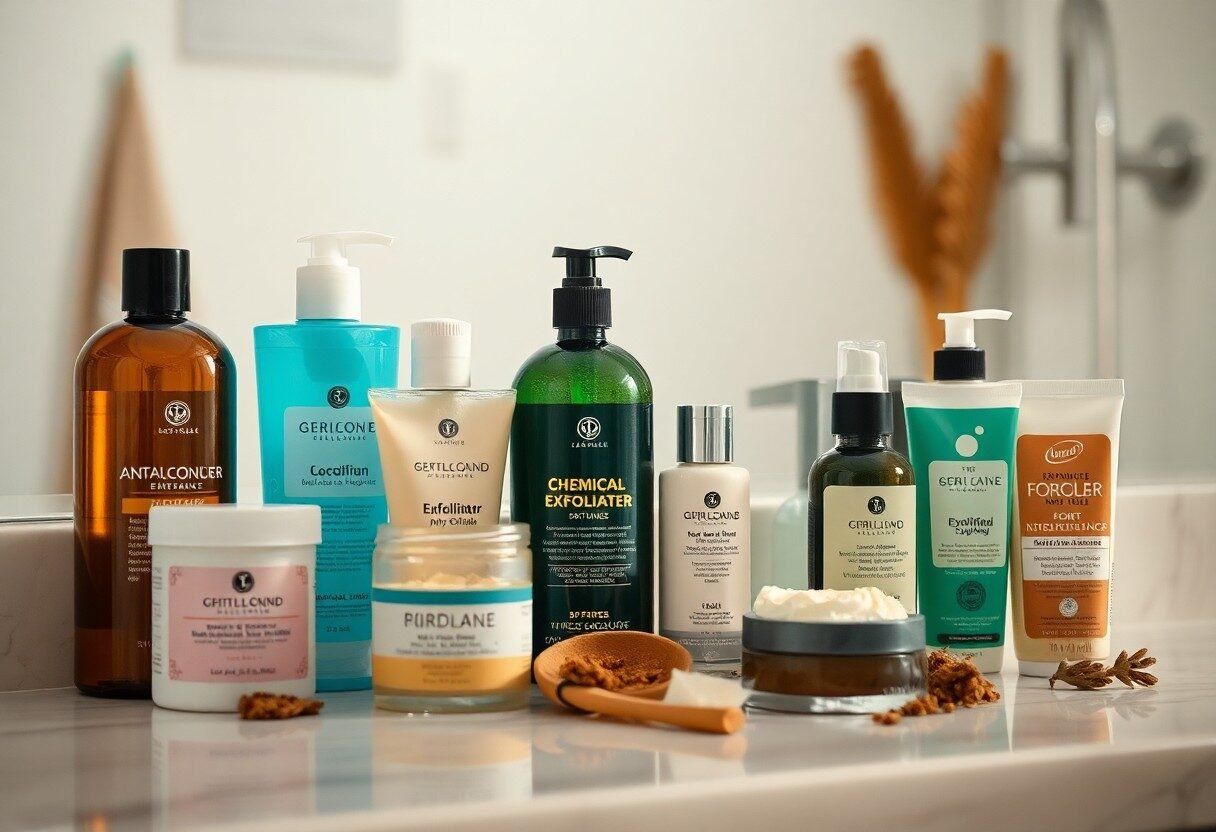
At-Home Exfoliation vs. Professional Treatments
Effective At-Home Options for DIY Skincare
For those who prefer a hands-on approach, at-home exfoliation offers an array of effective options. I often recommend gentle scrubs containing natural ingredients like brown sugar or oatmeal that work to buff away dead skin without causing irritation. Homemade masks with ingredients like honey and yogurt can provide both exfoliation and hydration. Consider using exfoliating tools such as a soft konjac sponge that can be used daily for mild exfoliation, maintaining a luminous complexion right from the comfort of your bathroom.
Considerations for Professional Chemical Peels
Professional chemical peels can offer transformative results, particularly for those battling hyperpigmentation or uneven skin tone. Assessing your skin type and goals with a qualified dermatologist first is vital; they can recommend the right type of peel, ranging from superficial to deeper treatments. Skin sensitivity and recovery time are also key factors; some peels may lead to peeling and redness that could last from several days to weeks.
Deepening the conversation about professional chemical peels, it’s vital to understand that these treatments work on a cellular level, effectively removing layers of skin to reveal a brighter and smoother surface underneath. Many peels utilize ingredients like glycolic acid or salicylic acid, tailored for specific skin concerns, such as acne or aging. As you weigh your options, consider the texture and tone of your skin—those with darker complexions often need peels designed to avoid post-inflammatory hyperpigmentation. Consulting with a skilled professional ensures your unique skin type is prioritized, delivering results that shine rather than compromise your natural beauty.
The Best Exfoliators on the Market for African American Skin
Top Chemical Exfoliants and Their Benefits
For melanin-rich skin, AHAs like glycolic acid and BHAs such as salicylic acid are fantastic options. They gently dissolve dead skin cells and unclog pores, promoting a smoother complexion. I’ve found that regular use can improve the appearance of dark spots and enhance overall skin tone. Products like the Paula’s Choice Skin Perfecting 2% BHA Liquid Exfoliant offer effective results without harsh side effects.
Highly Recommended Physical Exfoliators
Physical exfoliators can also be highly beneficial for your skin, especially when chosen wisely. Look for ones with fine particles that won’t irritate your skin, such as the Dermalogica Daily Microfoliant. This rice-based powder activates with water to create a gentle exfoliating paste that’s suitable for daily use. Unlike harsher scrubs, it helps maintain your skin’s natural moisture balance while effectively polishing away dullness.
The Acure Brilliantly Brightening Face Scrub is another great choice, featuring a blend of walnut shell powder and sea kelp to nourish the skin. Both scrubs not only remove dead skin but also brighten and even out skin tone, which is crucial for combating hyperpigmentation often seen in darker skin tones. Balancing exfoliation with hydration leads to truly beautiful skin!
Exfoliation Frequency: Finding Your Perfect Balance
Important Factors to Consider
To determine your ideal exfoliation frequency, consider your skin type, sensitivity, and the products you’re using. Exfoliating too frequently can lead to irritation, while not exfoliating enough may cause buildup. Here are some key factors:
- Skin Type: Oily, dry, combination, or sensitive
- Product Type: Chemical vs. physical exfoliators
- Seasonal Changes: Different care in summer vs. winter
- Skin Goals: Acne control, brightening, or texture smoothing
Knowing your skin’s needs will help you find that sweet spot for exfoliation.
Signs You’re Overdoing It
Excessive exfoliation can trigger adverse reactions. If you notice redness, increased sensitivity, or flakiness, you may need to ease up. Some clear indicators of over-exfoliation include:
Signs such as a burning sensation, persistent dryness, or breakouts can signal that I’ve gone overboard. Your skin’s barrier functions as a protective layer, and when it’s compromised, it can lead to increased vulnerability to irritation and infection. Fighting the urge to exfoliate daily can be tempting, but listening to your skin is vital. If I find that my usual routine isn’t yielding the desired results or I start experiencing discomfort, it’s definitely time to reassess my exfoliation habits.
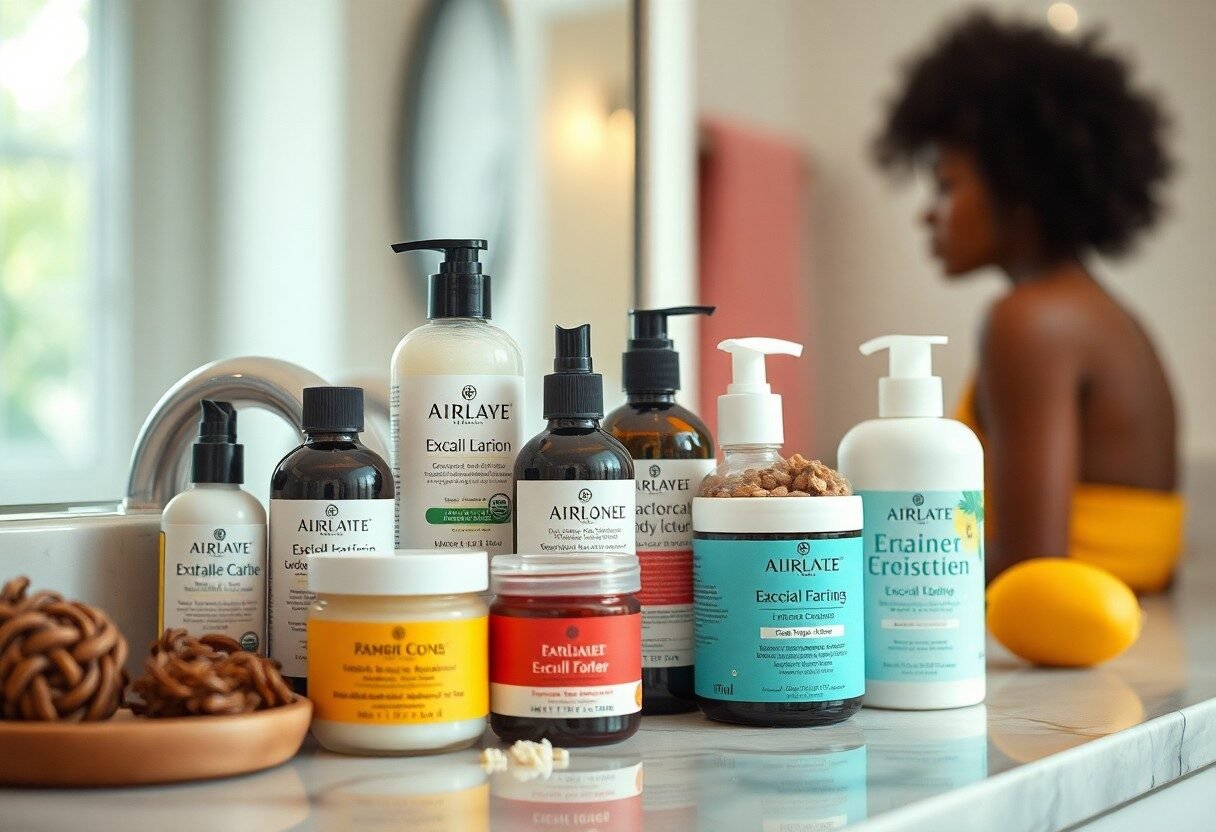
Beyond Exfoliation: Complementary Skin Care Practices
The Role of Moisturizing and Sun Protection
Moisturizing and sun protection are integral to maintaining healthy skin, especially post-exfoliation. After removing dead skin cells, your skin is more vulnerable to environmental stressors. A quality moisturizer replenishes important hydration, while a broad-spectrum SPF prevents pigmentation and sun damage, both vital for African American skin, which can develop hyperpigmentation. I always choose moisturizers with antioxidants to boost my skin’s resilience against oxidative stress and UV exposure.
Incorporating Hydrating Ingredients into Your Routine
Hydrating ingredients like hyaluronic acid, glycerin, and aloe vera should be staples in your skincare routine. These ingredients attract moisture to the skin and enhance its overall texture and appearance. Using serums or creams enriched with these components can maintain skin elasticity and radiance, especially after exfoliating, as they lock in moisture and promote healing.
Exploring specific hydrating ingredients can elevate your skincare game significantly. For instance, hyaluronic acid can hold up to 1000 times its weight in water, making it a powerhouse in keeping your skin plump. Glycerin, a humectant, actively draws moisture from the air, ensuring your skin remains adequately hydrated. If you experience dryness, incorporating products that contain these ingredients can lead to smoother, more supple skin while nurturing your complexion post-exfoliation. Maintaining a diligent regimen with hydrating elements leads to a noticeable glow that enhances your natural beauty.
To wrap up
Conclusively, I’ve explored the best exfoliators for African American women that cater specifically to your unique skin needs. Whether you prefer chemical or physical exfoliants, it’s important to choose a product that enhances your natural radiance while addressing concerns like hyperpigmentation and dry skin. By incorporating these exfoliators into your skincare routine, you can achieve a smoother, brighter complexion. Always listen to your skin and adapt your choices as needed for the best results.
FAQ
Q: Why is exfoliation important for African American skin?
A: Exfoliation is important for African American skin as it helps remove dead skin cells, which can lead to a dull complexion. It also promotes cell turnover, which can reduce the appearance of dark spots and hyperpigmentation common in darker skin tones. Additionally, regular exfoliation can improve skin texture and allow for better penetration of moisturizers and other skincare products.
Q: What types of exfoliators are best for African American women?
A: The best types of exfoliators for African American women include both physical and chemical exfoliators. Physical exfoliators, such as scrubs with gentle granules, can be effective, but should be used with caution to avoid irritation. Chemical exfoliators that contain AHAs (alpha-hydroxy acids) and BHAs (beta-hydroxy acids) are also popular options, as they help to dissolve dead skin cells without manual scrubbing, making them gentler on the skin.
Q: How often should African American women exfoliate their skin?
A: Generally, it is recommended that African American women exfoliate their skin 1-2 times a week. However, this can vary depending on individual skin types and sensitivities. Those with sensitive skin may benefit from less frequent exfoliation, while those with oily or thicker skin types might afford to exfoliate more regularly. It’s important to listen to your skin and adjust as needed.
Q: Can exfoliation help with ingrown hairs common in African American women?
A: Yes, exfoliation can help reduce the occurrence of ingrown hairs, which are often a concern for African American women due to the texture of their hair. Regular exfoliation helps to keep the hair follicles clear and can prevent hairs from becoming trapped under the skin. Incorporating exfoliation into a regular grooming routine can significantly improve skin health and appearance.
Q: Are there any natural exfoliators that work well for African American skin?
A: Yes, there are several natural exfoliators that can benefit African American skin. Ingredients such as sugar, coffee grounds, and ground oats make excellent physical exfoliants, while natural acids from fruits like pineapple and papaya serve as effective chemical exfoliants. Always perform a patch test when using new ingredients to ensure they do not cause irritation.
Q: Should I follow exfoliation with specific products for African American skin?
A: Yes, following exfoliation, it is beneficial to apply a targeted treatment, such as serums or moisturizers that address specific concerns ranging from hydration to hyperpigmentation. Look for products containing ingredients such as hyaluronic acid, vitamin C, or niacinamide which can enhance your skin’s appearance and provide additional benefits after exfoliation.
Q: Are there any potential side effects of exfoliation for African American women?
A: While exfoliation can provide many benefits, it can also lead to potential side effects if not done correctly. Over-exfoliation can result in skin irritation, redness, and increased sensitivity. It’s crucial to find a balance and choose products suited to your skin type. If any adverse reactions occur, it’s advisable to pause exfoliation and consult with a dermatologist for guidance.
